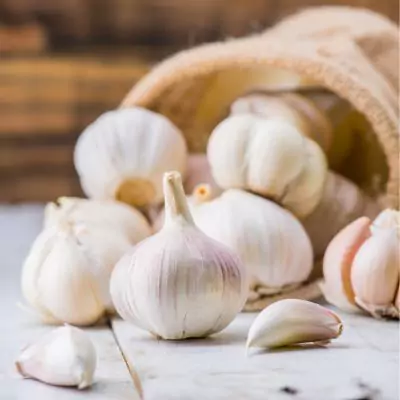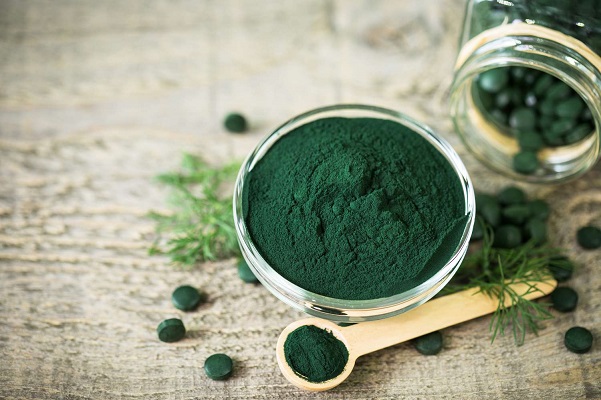On This Page
Overview
Strong-smelling, flavorful herb garlic is known for its numerous health advantages. It has a potent substance called allicin that helps reduce cholesterol. Garlic may help with cold symptoms, lower blood pressure, minimize the risk of heart disease and neurological illnesses, as well as reduce symptoms of the common cold.
There are numerous uses for garlic bulbs. It is certainly an all-arounder when it comes to choosing to eat healthily, being used for everything from cooking to therapeutic purposes.
Lahsun and garlic are frequent names for rasona. It promotes longevity and is regarded as an anti-aging spice.
This herb has several health advantages, including cardiovascular benefits, digestive and respiratory health, and healthy blood pressure and cholesterol levels. Additionally, this plant is helpful for the eyes, heart, digestion, and eyes. It also strengthens hair and increases libido.
Synonyms of Garlic
- Allium sativum
- Lahsun
- Belluli
- Vellulli
Nutritional Facts of Garlic
| Energy: | 149 kcal |
| Carbohydrates: | 33.06 g |
| Sugars: | 1 g |
| Dietary fiber: | 2.1 g |
| Protein: | 6.36 g |
| Fat: | 0.5 g |
Phytochemical Constituents of Garlic
- N-acetylcysteine (NAC)
- S-allyl-cysteine (SAC)
- S-allyl-mercapto cysteine (SAMC)
Therapeutic Uses of Garlic
- Reduces the Blood Pressure
Garlic’s sulfur encourages the blood arteries to produce more nitric oxide. As a result, it eases their tension and increases their flexibility, assisting in the reduction of blood pressure and the danger of strokes and artery hardening.
- Controls Cough and Cold
Cough and cold can be controlled by the consumption of raw garlic. Consuming two smashed garlic in the morning gives you the best results. Garlic bulbs strung on a thread and hung around a child’s or baby’s neck are claimed to treat congestion symptoms.
- Improve Digestion
Regular consumption of raw garlic cloves can help with digestive issues. This herb may even help to lessen gastrointestinal canal inflammation or irritation. Most gastrointestinal issues, including colitis, diarrhea, and dysentery, may be resolved with the use of garlic.
- Battle allergies
Diallyl sulfide and thiacremonone are responsible for garlic’s anti-arthritic properties. It has also been demonstrated that garlic reduces allergic airway irritation (allergic rhinitis).
Home Remedies of Garlic
- For Respiratory Issues
Cough, nasal congestion, and sore throat – symptoms of nasal allergy and flu can all be effectively treated by taking garlic with sugar syrup.
- Easy digestion
When consumed with milk at night, 1-2 raw garlic cloves can improve digestion and encourage stool that passes more easily. This implies you don’t need to exert yourself and aggravate hemorrhoids. Consuming garlic might therefore gradually reduce the irritation that is present close to the anal or rectal region.
- Ease Menstrual pain
Menstrual pain can be relieved by cooking 3–4 garlic cloves in a glass of water and drinking the mixture three times each day.
- Kills stomach worm
Garlic also helps to destroy stomach worms. Takinggarlic juice with honey daily for seven days continuously kills stomach worms.

Have A Health Issue?
Consult Online
- Dr. Sahil Gupta (B.A.M.S., M.H.A.)
Ayurvedic Allergy Specialist
CEO & Founder of IAFA®
Ayurvedic Aspects of Garlic
Garlic (Lashuna), according to Ayurveda, has five tastes: sweet, sour, pungent, bitter, and astringent (pancharasa).
It is nourishing (balya), enhances vision in the eyes (Chakushya), ignites the digestive fire, and has antibacterial, aphrodisiac, and heart and brain tonic properties (jantughna). It enhances complexion (varnya), speeds up the healing of fractures (bhagnasandhankar), purifies the blood (raktadoshhar), balances Vata and Kapha doshas, and intensifies Pitta doshas. Garlic is also called mahoushadha due to its activity. In other words, it heals diseases brought on by a vata imbalance. It is capable of curing a variety of illnesses.
Daily dose: Consuming 1-2 bulbs (3-6 grams) of garlic per day may have health advantages, even though there are no official recommendations for how much garlic you should consume.
Side Effects of Garlic
- Nausea
Fresh garlic bulbs should not be consumed on an empty stomach, as it may result in nausea, vomiting, and heartburn. Eating garlic can make you feel sick and have heartburn.
- Aggravates bleeding
Since garlic naturally thins the blood, we shouldn’t combine it with other blood-thinning medications like aspirin or warfarin. This is due to the potentially harmful interaction between garlic and blood thinners, which could raise the risk of internal bleeding.
- Sweating
According to research, some people may experience excessive sweating as a result of garlic.
- Eczema
Garlic exposure over a long period may irritate the skin. Garlic’s particular enzymes may cause this discomfort. Eczema may also be a disorder that comes along with this allergy.
Conclusion
Garlic is unquestionably a herb that will improve any dish. It improves flavor and smell while also providing additional health advantages, such as weight loss. Additionally, the nutritious food bulb contains calcium, phosphorus, and manganese, all of which have great health advantages. But also be mindful of its excessive usage. Garlic side effects are mostly linked to sustained overconsumption. In addition to causing liver damage, high amounts of garlic can also cause sweating, migraines, dizziness, visual disturbances, heartburn, foul breath, gastrointestinal problems, and yeast infections. Additionally, it could reduce blood pressure and interfere with some drugs. If you undergo any side effects or garlic allergies you can consult with Dr. Gupta at IAFA®.
References
- https://en.wikipedia.org/wiki/Garlic#:~:text=Per%20100%20gram%20serving%2C%20garlic,and%20less%20than%201%25%20fat.
- https://www.ncbi.nlm.nih.gov/pmc/articles/PMC7146530/#:~:text=Garlic%20formulations%20consist%20of%20several,derived%20from%20alliin%20%5B34%5D.









